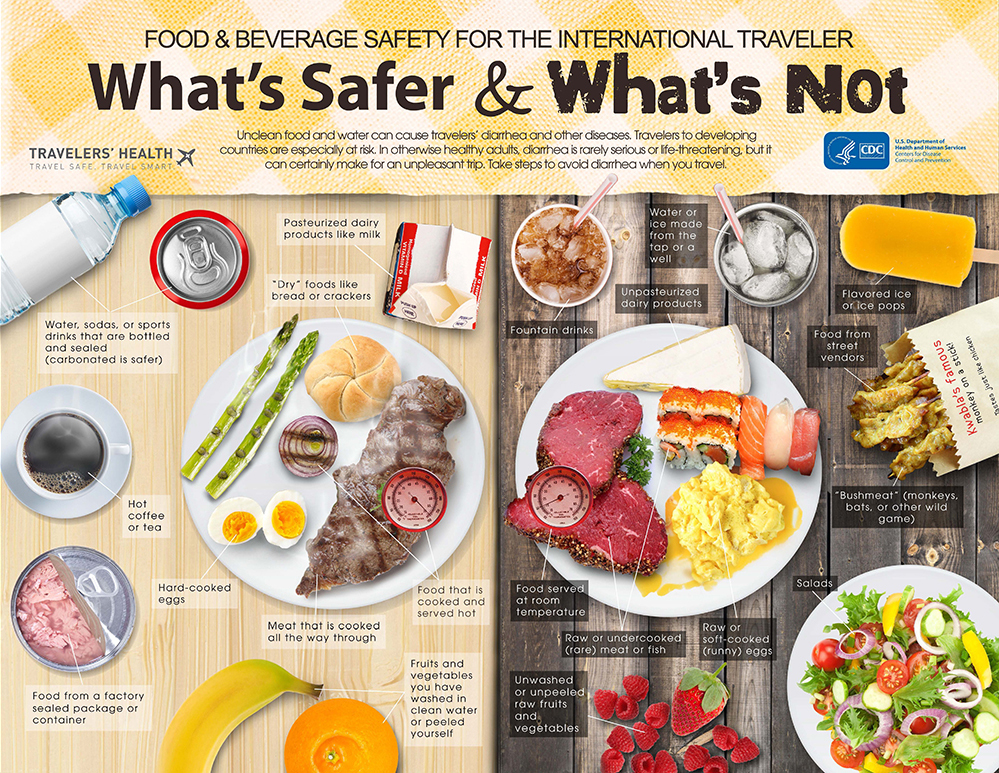



International travel can be an exhilarating experience—learning about new customs, languages and trying new foods. Unfortunately, foreign countries can have varying standards regarding the safety of food preparation, storage and serving. You may be at an even greater disadvantage if you’re traveling somewhere you don’t speak the native language and can’t ask questions.
To avoid any potential stomach upset, we’ve compiled a list of advice from FoodSafety.gov, the CDC and other experts filled with Do’s and Don’ts to follow before and during your international voyage
Do: Consider purchasing international medical insurance coverage. Prices can vary dramatically, with most packages costing between 5 and 12 percent of the total trip. Age is one of the biggest factors affecting the price: rates go up dramatically for every decade over age 50. Still, it is a small price to pay when you consider you don’t know how your body will react to being in a new climate.
Don't: Assume one size fits all. There are many international medical insurance providers and it’s worth the time to shop around and find the right policy tailored to your specific needs. Just remember to purchase the policy before your trip and keep one copy with you in your carry-on luggage, one in your checked luggage and the third in your wallet/purse.
Do: Research in advance reliable, destination medical care if and when you need it. The Centers for Disease Control (CDC) website has very useful information on typical ailments experienced by foreign travelers in specific locations, in addition to general recommendations on what action to take if an emergency happens.
Don't: Eat anything raw, undercooked, unpasteurized or unrefrigerated. Stay away from street vendors—the locals have built up a tolerance to the local bacteria in the foods, but you have not. You can’t predict how spicy/rich the local cuisine will be and how your GI tract will process it.
Do: Drink lots of bottled water and use it for teeth brushing as well. You want to rehydrate and not swallow water (especially tap) from a place that might not have the same sanitation regulations as you’re accustomed to in your own country. Instead, choose bottled water from a recognizable international carrier (Evian, Arrowhead, Fiji, Alhambra, Crystal Geyser, etc.)
Don't: Trust just any bottled water. Dishonest vendors in some countries may sell tap water in local bottles sealed with a drop of glue to mimic legitimate factory seals. If the only source of water available is locally bottled or tap, boil the water before consuming it. This advice also applies to tooth brushing. When bathing, keep your mouth and eyes closed, and your nostrils facing away from the water stream.
Do: Seek out safe foods. The first rule of thumb in a foreign country is to stick to eating foods you recognize and have eaten before. Thoroughly cooked fruits, vegetables, meat, poultry, eggs and fish should all be safe if from a reputable source. Raw fruits or vegetables that have a thick covering (citrus fruits, bananas and melons) that you can wash in safe water and peel yourself should be okay. Additionally, anything dry, packaged and factory sealed (bread, potato chips, crackers, etc.) is given the thumbs up by the CDC.
Don't: Drink fountain drinks, juice, milk, alcohol or anything that didn’t come from a sealed container. Carbonated drinks such as soda and sparkling water are safest to consume since the bubbles indicate the bottle was sealed at a reputable factory.
Don't: Continue to travel if you feel queasy. It is highly recommended you seek medical assistance and carry emergency contact information with you at all times, including any allergies to medications or outside elements. If you are on the last day of your trip, be advised that many airlines will prevent you from boarding your flight home if you look sick. There is a high possibility you will need clearance from a medical facility stating you are in sufficient health before you are allowed to fly again.
Remember:
